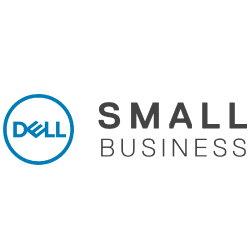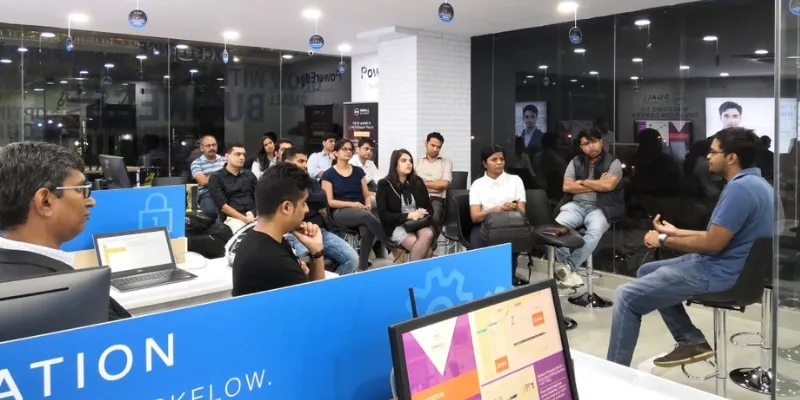
Dell Small Business
View Brand PublisherConversations and connections: 11 innovative scale-ups we met at the Dell Small Business Solution Center meetup
Earlier this year, Dell had inaugurated a first-of-its-kind space for entrepreneurs in the country: the Dell Small Business Solution Center. The space was created as an experience centre for small businesses where entrepreneurs can co-work, connect and collaborate.
Dell Small Business Solution Center is designed to be an extension of an entrepreneur’s office. Startups, B2B customers, and independent software vendors are free to use the space to work, meetup, network, and collaborate. The space is even fitted-out to allow entrepreneurs and software vendors to showcase and demo their products to customers. There’s also coffee and Wi-Fi connectivity as an incentive.

At a recent meet-up at the center, we saw a few scale-ups, industry experts, and Dell SB advisors coming together to talk about opportunities, challenges, tech, how to find and hire the right talent, and the best investment and security strategies for small businesses.
11 startups with unique solutions to quintessential problems faced by India came together as part of a meetup facilitated by Dell and YourStory. The event, held on December 5, 2018 at the Dell Small Business Solution Centre in Bengaluru, also focused on the importance of platforms and servers, monetising data and protecting customer data.
One of the key takeaways to emerge that evening was: Investors invest in companies that solve a core problem. And a number of the startups at the event know this very well, having been through the process of coming up with a unique idea that solves essential problems in the country and pitching to investors. Here are the 11 startups with their cutting-edge products and services:
Founded in 2016 by Prrashanth Nagaraj, Bengaluru-based DigiConnectt is a sales enablement analytics solution dedicated to reducing the workload for sales executives. Prrashanth, who had a decade's experience in sales, realised that there was a problem with a number of sales-enabling applications. While most promised to assist sales, a majority of them required manual data entry which is time-consuming. Prrashanth believes that sales is a creative field, and that salespeople should not have to sit in front of a computer and type data manually. His solution aims to help the salesforce by using Artificial Intelligence to reduce manual entries by 70 percent and increase data collection by 30 percent. "I took five 5 years to build this solution and now we’ve launched in the Indian market in October 2017, gaining some early traction and starting our operations in the US early this month," he says.
2) Cardiotrack
Avin Agarwal and Dr. Ashim Roy have helped save 1,500+ lives with their platform Cardiotrack. In 2014, the duo came together to invent an IoT and AI-based healthcare platform that connects primary care centres to secondary and tertiary care centres in Tier 2 and Tier 3 towns. With Cardiotrack, patients from these smaller centres can be screened at a primary care centre closer to their homes or, in some cases, even at home, and the problem can be diagnosed at an early stage. The device, which also has an app, provides support to the patient through a network of specialists on their platform.
The solution from the Bengaluru-based startup is now deployed across 800 locations in India and six other countries. On their future plans, Ashim says, "We want to scale up and enroll every public health centre in every district and reach out to 1 million patients in the next two years." They aim to create a network of primary care doctors who are more closely associated with their patients and hospitals or tertiary care providers who are providing their specialist opinion and treatment to these heart patients on the platform.
3) Increff
Short for Incredible Efficiency, Increff was founded by Romil Jain, Rahul Jain and Anshuman Agarwal in 2016 and focuses on improving inventory efficiency for fashion brands and retailers. "Today in India, 90 percent of brands carry 150-200 days of inventory which is inefficient. All your margins are mostly lost because of inefficient planning,” says Anshuman. They have two products, the first one being a merchandising, planning and distribution product which looks at historical sales data, pricing and discounting data, inventory availability and buying cycles on a daily basis. Using over 300 algorithms to analyse stores in the background, it gives brands manufacturing insights. This includes the right merchandising channel, the categories to manufacture, the styles in each category, the size-set ratio and so on.
The second product is based around fulfilment which is a complex area in fashion because of multiple sales channels. Brands end up creating a dedicated inventory for each channel and in some cases, they are not able to replenish it within the season. And if something isn't selling, they can’t recall it either. Increff has created a platform which can digitally aggregate the inventory from various warehouses and showcase it to all the sales channels. Whoever gets the order gets the inventory. This does away with the problem of dead inventory. “The sell-through rate and margins for our customers have improved drastically. We plan to create a stronger foothold in the Indian market in the next six months because there is enough untapped potential in here."
After about 17 years in the corporate sector, Atul Satija made a jump to start The/Nudge Foundation in 2015, which is a for purpose, not-for-profit organisation focused on poverty alleviation. They impart employability skills to youth from the underprivileged sector in the age group of 18 to 25 years. Supported by several established trusts and corporates, they have helped with the skilling of around 2,500 students and achieved 100 percent placement over the last three years. Apart from their flagship programme Gurukul, they also have an initiative called N/Core which is an incubator for not-for-profit organisations. Based in Bengaluru, the organisation plans to scale their flagship programme to transform the lives of thousands of students and underprivileged youth in the next few years.
When Dr. Srinivas Dorasala, Niranjan Subbarao and Dr. Ravi Nayar realised that critical medical devices were expensive and not easily accessible to everyone, they decided to change that. Thus began the journey of Cyclops, a medtech startup working in the neuro vestibular diagnostics space, in 2015. Their product is extensively used by neurologists, ENT specialists and audiologists to track pupillary responses to find the root cause of dizziness and imbalance disorders. "It's a three-tiered hardware solution, which is a pair of eye-tracking glasses that image and track the pupillary response. We run image processing on the desktop environment, extract values from pupillary data, push it to the cloud, and run machine learning on the cloud. We also vet these reports by a team of trained clinicians before sending it back," says Niranjan.
They are looking at rapidly scaling the installation rate of their current product, with a mission to democratise the accessibility, availability and affordability of medical devices. They are also building two more products in the neuro vestibular space.
6) Fabric Monde
Jyothirmayi, Hemalatha and Ranjith started Fabric Monde in 2017 to turn the spotlight on talented rural manufacturers and vendors, who otherwise aren't getting enough recognition. They source low carbon footprint fabrics like handlooms and khadi from rural areas in India and supply them to larger brands such as Raymonds, Aravind and US Polo, among others. The startup’s founders say that these established names procure from Fabric Monde because their technology help these brands take the right decisions and experience the fabrics differently. "They are unique fabrics and they need special technological intervention like visualisation and Artificial Intelligence. We've also built our own ERP to enhance the overall experience of working with these fabrics," says Jyothirmayi. Once they collect data points for 5,000 SKUs from the rural manufacturers, they present it to the brands through their platform. In the last 1.5 years, they have built relationships with over 100 clients and have reached a revenue generating stage.
AI and astrology, don’t sound like a match made in heaven but Pawan Gupta and Rahul Namdev made the combination work when they started a new-age matchmaking platform for Indians. Based on the premise that it is the individuals who are the primary decision-makers in choosing their life partners and not their parents, betterhalf.ai analyses the individual through a series of questions before he/she registers on the platform. This is based on personality, social presence, financial level, age and so on. With the help of their algorithms which they developed at MIT using rigorous personality models, they match them to a compatible candidate. Founded in 2016 and based in Bengaluru, they now have more than 5,000 users on the platform, both from India and abroad.
8) Kristal.AI
In 2016, Asheesh Chanda and Vineeth Narasimhan wanted to bring 'intelligence' into intelligent investing. What started as an ambitious idea on a blackboard is now present in India, Singapore and Hong Kong. Kristal.AI is an AI-enabled digital asset management platform that provides investors access to curated portfolios from the world's top portfolio managers. Using their proprietary algorithm, investors can choose the best investment strategies to meet their financial goals. They have a diverse team of financial advisors, researchers, and market experts who take a unique yet holistic approach to provide the best investment options. They also have an app.
9) VideoKen
Thanks to Manish Gupta, Ashish Vikram and Vishnu Raned, finding a specific piece of information from a long video is now a piece of cake. Founded in 2017, VideoKen is making videos less opaque and more interactive with its AI-based video product solutions and advanced video indexing technologies. These are built out of a foundation of cutting-edge research which involves Big Data Analytics, Machine Learning and Artificial Intelligence. Just like you would in a book, you can index all kinds of videos using their solution, from conferences to trainings to webinars, among others. You can also add call-to-actions and view data insights to further enhance the ROI on your videos.
10) Scapic
In 2017, Ajay PV and Sai Krishna created a platform that lets people build, share and explore immersive experiences for presentations, sales tools, portfolios, educational content, brand marketing and other, using VR and AR right from their web browser. The best part is that there's no coding required, you just need to simply drag and drop. With just a browser and an idea, the cloud-based content collaboration tool lets you create a detailed experience or ‘scapes’ or even entire connected worlds in just hours.
Founded by Ramesh Srinivas, Ravi Bhamidipati, Sudha Bhamidipati, Suneel Aiyer, Anant Sood, and Sivaramakrishnan in 2015, Worxogo is a B2B product company that uses predictive analytics, behavioural design, and neuroscience to enhance employee performance. Their AI engine acts as a personal coach for employees to assess their current performance individually and nudges them to improve when intervention is needed. Their unique AI engine, Mia, operates at the intersection of neuroscience, predictive analytics and behavioural design and tracks millions of performance behaviour instances of more than 100K users across enterprises. This has significantly impacted sales, employee productivity and supplier efficiency for their clients.
Drop in to collaborate, network or showcase
In keeping with the entrepreneurial nature of the space, The Dell Small Business Solution Center is happy to host startups and ecosystem players who could drop by to collaborate, network, showcase solutions, or be a part of meetups. To enquire, drop them a mail at [email protected].







